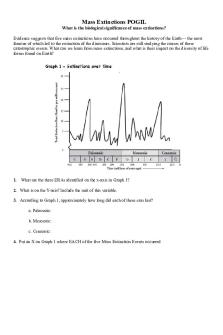Unifying Principles of Biology 2021 PDF

| Title | Unifying Principles of Biology 2021 |
|---|---|
| Course | Health promotion |
| Institution | Walter Sisulu University |
| Pages | 2 |
| File Size | 63.2 KB |
| File Type | |
| Total Downloads | 8 |
| Total Views | 147 |
Summary
Principles of biology...
Description
UNIFYING PRINCIPLES OF BIOLOGY
The word principle can be defined as a fundamental truth or proposition that serves as the foundation for a system of belief or behaviour or for chain of reasoning. A principle of biology is a fundamental concept that is just as true as a bee or sunflower as it is for us. All life, including that of sunflower and bee is made of atleast one cell. The traits of a particular organism are embedded within its genes, that organism must maintain homeostasis to survive, and that organism has evolved from previously existing species.
Unifying Principles of Biology There are FOUR unifying principles of biology that are important to all life and form foundation of modern biology. These are: •
The cell theory
•
The gene theory
•
Homeostasis
•
Evolutionary theory
The Cell Theory The cell is the basic unit of structure and function of all organism. The cell theory states that all living things are made up of one or more cells, or the secretions of those cells. For example, shell and bone are built buy cells from substances that they secrete into their surroundings. Cells come from cells that already exist, that is they do not suddenly appear from nowhere. In organisms that are made of made cells (multicellular organisms), every cell in the organism's body derived from the single cell that results from fertilized egg.
The Gene Theory An organism's traits are encoded in their DNA, the large molecule, or macromolecule, that holds the instructions needed to build cells and organisms. DNA makes up the genes of an organism. Traits are passed from one generation to the next by way of these genes. Information for how the organism appears and how its cells work come from the organism's environment, the environment does not change its genes. The only way that genes can change in response to a particular environment is through the process of evolution in populations of organism.
Homeostasis It is the ability of an organism to control its body functions in order to uphold a stable internal environment even when its external environment changes. For example, cells maintain a stable internal acidity (pH); a warm blooded animal maintain a constant body temperature.
Evolution Theory Evolution by natural selection, is the theory that maintains that a population's inherited traits change overtime, and that all known organisms have a common origin. This theory, initially described by Charles Darwin, describes why organisms must adapt to their environments....
Similar Free PDFs

Principles of Biology BIO120
- 2 Pages

Biology 150 2021
- 6 Pages

AP Biology Syllabus 2021
- 5 Pages

2021 Penrith Biology Trial Paper
- 50 Pages
Popular Institutions
- Tinajero National High School - Annex
- Politeknik Caltex Riau
- Yokohama City University
- SGT University
- University of Al-Qadisiyah
- Divine Word College of Vigan
- Techniek College Rotterdam
- Universidade de Santiago
- Universiti Teknologi MARA Cawangan Johor Kampus Pasir Gudang
- Poltekkes Kemenkes Yogyakarta
- Baguio City National High School
- Colegio san marcos
- preparatoria uno
- Centro de Bachillerato Tecnológico Industrial y de Servicios No. 107
- Dalian Maritime University
- Quang Trung Secondary School
- Colegio Tecnológico en Informática
- Corporación Regional de Educación Superior
- Grupo CEDVA
- Dar Al Uloom University
- Centro de Estudios Preuniversitarios de la Universidad Nacional de Ingeniería
- 上智大学
- Aakash International School, Nuna Majara
- San Felipe Neri Catholic School
- Kang Chiao International School - New Taipei City
- Misamis Occidental National High School
- Institución Educativa Escuela Normal Juan Ladrilleros
- Kolehiyo ng Pantukan
- Batanes State College
- Instituto Continental
- Sekolah Menengah Kejuruan Kesehatan Kaltara (Tarakan)
- Colegio de La Inmaculada Concepcion - Cebu











